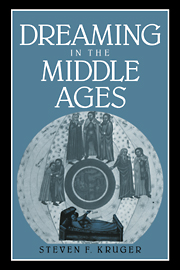Book contents
- Frontmatter
- Contents
- Acknowledgments
- List of abbreviations
- Introduction: modern and medieval dreams
- 1 Dreambooks and their audiences
- 2 The doubleness and middleness of dreams
- 3 The patristic dream
- 4 From the fourth to the twelfth century
- 5 Aristotle and the late-medieval dream
- 6 Dreams and fiction
- 7 Dreams and life
- Notes
- Bibliography
- Index
1 - Dreambooks and their audiences
Published online by Cambridge University Press: 22 August 2009
- Frontmatter
- Contents
- Acknowledgments
- List of abbreviations
- Introduction: modern and medieval dreams
- 1 Dreambooks and their audiences
- 2 The doubleness and middleness of dreams
- 3 The patristic dream
- 4 From the fourth to the twelfth century
- 5 Aristotle and the late-medieval dream
- 6 Dreams and fiction
- 7 Dreams and life
- Notes
- Bibliography
- Index
Summary
DREAM DIVINATION
Writers of the high and late Middle Ages treated the experience of dreaming with simultaneous anxiety and fascination. On the one hand, they saw dreams as dangerous, associated with pagan practices and demonic seduction. On the other, they claimed that dreams could be divinely inspired and foretell the future. After all, saints' lives were filled with revelatory dreams, and the Fathers of the church recounted veridical dreams that they themselves experienced. The Bible itself – in the Old Testament stories of Joseph and Daniel (Genesis, chapters 37, 40, 41; Daniel, chapters 2, 4, 7–8, 10–12) and in the appearances of God's angel to the New Testament Joseph (Matthew 1:20–24, 2:13, 2:19–22) – validates the use of dreams as predictive tools. But the Bible also lends its authority to a distrust of the dream, at certain points strongly condemning the practice of dream divination:
Quando ingressus fueris terram quam Dominus Deus tuus dabit tibi cave ne imitari velis abominationes illarum gentium / nec inveniatur in te … qui arioles sciscitetur et observet somnia atque auguria ne sit maleficus / ne incantator ne pythones consulat ne divinos et quaerat a mortuis veritatem / omnia enim haec abominatur Dominus.
(Deuteronomy 18:9–12; my emphasis)When thou art come into the land which the Lord thy God shall give thee, beware lest thou have a mind to imitate the abominations of those nations.
- Type
- Chapter
- Information
- Dreaming in the Middle Ages , pp. 7 - 16Publisher: Cambridge University PressPrint publication year: 1992



